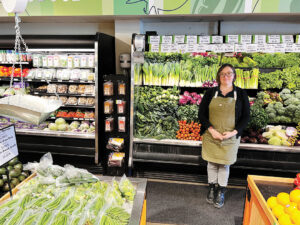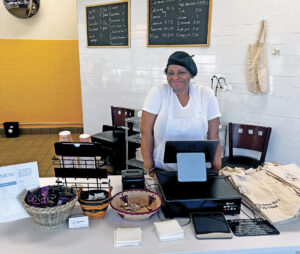Managing inventory
5/1/2024“Inventory management is what can dictate some of your cash flow. And as we know, in business, cash is king,” said Lisa Shimkat, the state director of America’s Small Business Development Center Iowa (SBDC Iowa).
Business is all about maximizing profits and minimizing costs. Inventory management is the same way. Order too much, and inventory becomes obsolete; not ordering enough means missed sales. Optimizing levels of inventory for small businesses is a skill that takes years to master. It becomes even more difficult when that inventory is perishable, or worse, living. Read on for tips from SBDC Iowa on improving inventory management and hear how some Des Moines businesses handle inventory challenges.
New way of doing business
The SBDC Iowa provides no-cost counseling to businesses and entrepreneurs. The organization connects about 4,000 clients every year to resources they need to improve their business. They serve an even split of new and existing businesses.
In recent years, Shimkat has heard a fair share of entrepreneurs struggling with inventory management, supply chain shortages or delivery delays due to the pandemic. However, these issues can no longer be blamed on COVID. Businesses must accept the current reality and look into a new way of doing things, she said.
One of the first things SBDC Iowa recommends having is more than one supplier and multiple methods of receiving goods. Developing good relationships with suppliers might come in handy down the road. Shimkat also recommended businesses determine their “just-in-time” inventory, as inventory suppliers can deliver in a short amount of time. Rather than using real estate for a product suppliers can deliver in three to four days, she suggests making smaller orders more frequently. Renting 5,000 square feet instead of 10,000 reduces a fixed cost that can instead help the bottom line.
Reduce prices
Reducing prices is not always a bad thing. What if a business owner purchases something for $500, invests another $500 into it, and asks $1,200 for it, but in six months still has no buyers interested in it?
“Is it a bad thing to sell it for $700?” Shimkat asked. “No, because it comes back to the cash flow. Right now, that business owner has $1,000 locked up in something that no consumer wants…Why not instead find a way to garner some cash, recover some investment from it so you can take that money and make that new money work for you?”
Listen to customers
According to Shimkat, 75% of new restaurants fail in their first year. The ones that succeed actively listen to customers and involve them in the inventory process.
For restaurants, customers might want something locally sourced, vegan options or allergen-free choices. For retail stores, customers might want items ethically sourced or made in America.
Training staff to engage with customers is a surefire way to hear consumer opinions. But thinking outside the box might offer some more creative solutions. A boutique clothing store in Shimkat’s hometown started Wednesday night fashion shows on Facebook Live during COVID. Customers could easily message the account and place an order for pickup later that week. The owners recognized the popularity and continue the tradition weekly to this day.
Perishable inventory
With perishable inventory, it all comes down to the basics.
“You need to make sure that you have a good inventory system, a good rack system within your cooler and that your employees are trained,” Shimkat said. “[Have] a good rotation system and a good training system for the employees so that it becomes ingrained.”
Recording perishable inventory expiration and receiving dates are a start. Practices like FIFO — first-in-first-out — improve a business’ ability to maximize profits and minimize loss.
Shimkat recommended reaching out to organizations like the Iowa Restaurant Association, CIRAS at Iowa State University or SBDC Iowa for resources on creating menus or building inventory processes.
Reach out to other businesses
At the end of the day, the best thing business owners can do to improve their inventory management is to reach out to other businesses. It could be within the same industry to gain insight on the best software to use, nearby suppliers, etc. Or reach across industry lines and create partnerships like floral shops, restaurants and booksellers cross-promoting for Mother’s Day.
So how do some Des Moines businesses handle the challenge?

Campbell’s Nutrition features a variety of grocery items that are organic, local, fairly traded and come from sustainable farming practices.
Campbell’s Nutrition
Diane Lahodny has owned and operated Campbell’s Nutrition for 34 years. They have two locations: 4040 University Ave. in Des Moines and 2749 100th St. in Urbandale. The company sells a variety of grocery items that are organic, local, fairly traded and come from sustainable farming practices.
According to Lahodny, they are having more trouble procuring products now than they did during the pandemic, and she says her business is not the only one with this struggle.
“I belong to a group of little independent stores like this all over the country. We banded together to form an organization, a cooperative, called the Independent Natural Foods Retailers Association,” Lahodny said. “We collectively pool our buying power in order to be able to compete with places like Whole Foods. Not just on pricing but for procurement.”
Customer feedback and suggestions play an important role at Campbell’s. In the backroom, the team has a board covered in customer requests. If an item is up there multiple times, Lahodny gives it a shot. She is also not afraid to stock something for a single customer.
“I see you every week, and you say, ‘I love this dishwashing liquid, but could you please get it in lavender?’ I’m absolutely going to do that,” she said.

Vannessa Silva, produce manager of Gateway Market at 2002 Woodland Ave. in Des Moines, says, when it comes to something as perishable as produce, management needs to get their hands dirty and touch every item every day.
Gateway Market
Vannessa Silva is the produce manager of Gateway Market at 2002 Woodland Ave. in Des Moines. She says, when it comes to something as perishable as produce, management needs to get their hands dirty and touch every item every day. Some items tend to dry out, wrinkle or dimple in less than a day. Silva and her team do what they can to extend shelf life, like spraying fruits and vegetables. Another solution addresses the customers who avoid buying ripe fruit. Gateway will cut them up and sell prepackaged slices or use them in their salads.
“That’s another way you can reduce waste and keep an eye on things, finding multiple purposes for your product,” Silva said.
To keep inventory manageable, Silva avoids keeping stock in the backroom unless it is a fast-moving item. She wants it all out on the floor, easily visible. To do this, she will order from their main warehouses three times a week and locally once a week.
Climate-related weather issues make acquiring and selling produce even more difficult. Gateway receives products from California or South America, but when those regions experience crop shortages, they will have to go without the products in the store. Additionally, they will have to raise prices on the items they do have.
“Berries — the price has been so high for so long,” Silva said. “A lot of our sales were because of berries, and now we can’t make those.”
Silva worries customers will pivot to chain stores to purchase hard-to-obtain products.

For Nadia Ahissou, Nadia’s French Bakery, the biggest inventory challenge is having enough.
Nadia’s French Bakery
For Nadia Ahissou, the biggest inventory challenge is having enough. Nadia’s French Bakery at 2705 Grand Ave. in Des Moines consistently sells out of pastries each day.
“Since I’m working with only my two hands, I try to do what I can,” Ahissou said. “I only do what I can do; sometimes it’s not enough, but I don’t have a choice.”
Her storefront opened in January after her popularity soared at the Downtown Farmers’ Market in previous years. Right now, she is focused on getting more staff to help her at night to prepare pastries for the morning. She estimated, on slower days, like Mondays, she makes about 15 dozen pastries from scratch.
To keep up with demand, Ahissou orders fresh foods twice a week and ingredients once a week. If a supplier falls short or does not deliver on time, she will run to Costco herself to pick up ingredients.

Selling houseplants is not an easy business. The inventory is living, and customers only want perfect products, said Shelby Foote, owner of Art Terrarium at 520 Euclid Ave. in Highland Park.
Art Terrarium
Selling houseplants is not an easy business. The inventory is living, and customers only want perfect products.
“People come in with the mindset of, ‘I could kill this plant. I want to start at 100, not at 80%,’ ” said Shelby Foote, owner of Art Terrarium at 520 Euclid Ave. in Highland Park. “Even our discounted plants, they don’t go as quickly.”
The unique nature of the industry requires careful consideration when ordering.
“We have to make sure that, when we’re purchasing inventory, that it’s a plant that we know is going to move within a certain timeframe, or we know it’s going to survive and still look nice in our store for a longer period of time,” Foote said.
Art Terrarium makes sure their products are taken care of every step of the way. They only use vendors with temperature-controlled vans, use warmers in plant boxes and even arrange the store with optimal levels of light in mind. For Foote, mastering houseplant inventory is learned through trial and error.
“The graveyard is large,” she said. “It can be really fun and fancy to buy more exotic plants or specialty plants, but we have to know that it’s going to move and people are going to come in here and purchase it.” ♦


















